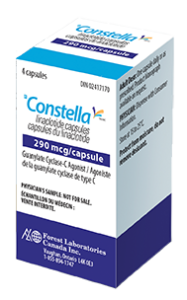Product Review
Constella® for IBS-C and Chronic Constipation
 Health Canada has approved a prescription treatment with indications for constipation-predominant irritable bowel syndrome (IBS-C) and chronic idiopathic constipation (CIC) in both men and women.1 Linaclotide (Constella®) might help adult patients with these conditions when other treatments, such as over-the-counter products, fail to provide effective long-term relief.
Health Canada has approved a prescription treatment with indications for constipation-predominant irritable bowel syndrome (IBS-C) and chronic idiopathic constipation (CIC) in both men and women.1 Linaclotide (Constella®) might help adult patients with these conditions when other treatments, such as over-the-counter products, fail to provide effective long-term relief.
Bowel movements vary among individuals and within the same individual over time. It is normal to have a bowel movement as frequently as three times a day or as infrequently as three times a week, provided the stool is soft and comfortable to pass.
A person experiencing constipation has hard or lumpy stool that is difficult to pass and is often accompanied by bloating and abdominal pain. Almost everyone experiences constipation occasionally, but for 15-20% of Canadians, it is a persistent, ongoing (chronic) condition. Similarly, 13-20% of Canadians are living with IBS at any given time. IBS is a chronic, often debilitating, functional gastrointestinal disorder.
When the predominant symptom is constipation, it is called IBS-C. For these patients, the digestive system’s contractions slow down, delaying transit time for products of digestion thereby allowing the bowel wall to absorb more water from the stool. About one-third of those who have IBS, have IBS-C.
In a recent study, which we reported on in the Inside Tract®, issue 185, researchers found that many IBS patients would, hypothetically, risk a 1% chance of immediate death for a 99% chance of a cure for their IBS symptoms.2 That study helped to show the degree of suffering these patients endure. Constella®, a minimally absorbed peptide, could fill a crucial treatment gap for some IBS patients, given its dual efficacy in decreasing pain and improving bowel movements.
Products available for occasional constipation, such as stool softeners and laxatives, sometimes have unpleasant side effects and are not appropriate for long-term use. This has left chronic idiopathic constipation and IBS-C sufferers with few choices for managing their condition.
Constella® is a guanylate cyclase-C (GC-C) agonist. Simply, it works by increasing intestinal fluid, which accelerates intestinal transit. It also reduces abdominal pain by decreasing the activity of pain-sensing nerves in the intestine. Constella® acts locally in the gut and is not systemically absorbed meaning that there are no side effects in other parts of the body. Patients normally take Constella®, an oral capsule, once a day on an empty stomach, half an hour before breakfast.
In clinical trials for chronic idiopathic constipation, Constella® showed a statistically significant improvement compared with placebo for complete spontaneous bowel movements. Trial patients experienced results within the first week of dosing, often on the first day, which were sustained over a 12-week treatment period. Improvement of abdominal pain sometimes took a little longer than one week of treatment. Constella® significantly improved abdominal bloating scores in CIC patients with prominent abdominal bloating at baseline.3
In clinical trials for IBS-C, Constella® showed statistically significant improvement in bowel habits (including spontaneous bowel movements, complete spontaneous bowel movements, stool consistency, and straining) and abdominal symptoms (including abdominal pain, bloating, abdominal discomfort, and percent of abdominal pain-free days) during the 26-week treatment period.
Across all studies, diarrhea was the most common adverse reaction to Constella®. Other reported adverse effects included flatulence, abdominal pain, bloating, vomiting, and fatigue, but these were uncommon. This medication is contraindicated in children younger than 6 years of age, and is not recommended for those between 6 and 18 years of age due to insufficient testing of the product in children.
We recently reviewed a product called Resotran® in the Inside Tract®, issue 183, which has an indication for chronic idiopathic constipation in women who have failed laxatives (though not for IBS-C). While Constella® works by increasing fluid in the intestinal tract, Resotran® works by stimulating the downward muscle movement (peristalsis) of the intestinal tract. Your physician can help you determine the best treatment for your situation.
Constella® might relieve some patients of constipation and associated abdominal pain: however, a return of symptoms could occur within one week of discontinuing Constella®. Therefore, if your physician prescribes this medication, it is important that you return for follow-up appointments to monitor treatment and determine how long you should continue to use it.
While not yet on the public formularies, currently about 85% of private plans cover Constella®.
